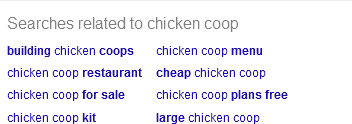Following the conventional strategy for keyword research almost always leads to failure or has a very low hit rate. It either teaches you to do the wrong thing entirely, or fails to point out major pitfalls.
I want to challenge how you think about keyword research and open your mind to new ideas for choosing keywords.
You may not agree as it goes against a lot of conventional wisdom, but you will walk away with new insightful ideas to boost your traffic and income. For some of you this will be the missing link about why you fail to get easy traffic.
Google Hides Data
Think about it… Google has an incentive to hide data on keywords from you for two major reasons…
1. If it reveals keywords with high traffic, then it is very easy to see if that keyword has low competition. Spammers could use automated tools to rank for all sorts of low hanging fruit which is what they did in the early days. Google put a stop to this by hiding data.
2. Google can potentially make more money by making it harder for SEOs to do research and find longtail lower competition keywords. It encourages businesses to give up the guessing game and bid on expensive keywords in Google Adwords where Google makes it’s money.
Google Inaccuracies
When the search volume is low (below 10,000) Google’s traffic count is pretty inaccurate.
It’s likely Google is pulling data from a small sample and extrapolating, which means a big percentage error compared to the actual real traffic is huge.
For example, 10,000 searches could actually be way higher or way lower, it could even be miniscule like 100 searches per month. Google used to tell you definite specific numbers like 100, 700, or 15,000 searches.
Now it just gives ranges, which allows them to further hide data as the ranges are ridiculously large.

The two keywords above could both have the same number of searches each month (1000 search per month) or have a difference of 9900 searches per month. That just leaves you completely guessing. And I’ve even found these ranges to be completely wrong. When I rank for a keyword, the traffic for that keyword can be way higher or lower than Google suggests.
Even if you find a keyword tool which gives specific numbers instead of ranges, they are still basing their numbers on sample data, so it’s still inaccurate.
Whatever tool you use, the lower the search volume the more inaccurate estimate becomes. So something with 50 searches a month could be 20x that or only 1 search per month. Therefore if Google shows any search count it is worth pursuing if competition is low.
I will still often go after a search term even if the Google Keyword Tool says no traffic just because I have a strong feeling or indicators there are people searching. In fact some of the easiest keywords to get traffic for Google says there is no traffic, and so less people are competing as they think it has no traffic.
That last bit is incredibly important… because Google is tricking people into thinking a low competition keyword has no traffic, it means you can take advantage of that.
Ghost of Google Past
Google’s search volume counts are backward looking, and they don’t tell you what is happening in the future. High volumes in the past 12 months tend to inflate the search volume number provided by Google even if the number of searches has been steadily, or even drastically decreasing.
Be sure to check your keyword on Google Trends to get glimpse of whether it looks to be a rising or falling trend for demand. Don’t make the mistake that 99% of economists make and extrapolate the current trend far off into the future without thought. That can sometimes work, but try to understand what is the cause for the demand rising or falling, and that will allow you to make a better educated guess of how search volume for that keyword will pan out in future.
So What Do You Do?
I don’t use keyword tools very much in general. They definitely have their uses for brainstorming, but I often find it quicker to simply do a bit research and use common sense.
What
you really want to be thinking is ‘what might people type in if they are
looking for my content/product’.
Too often people go for the top keyword like ‘cell phone’ but the key is going more specific and longtail. This brings more targeted traffic, is easier to rank for, and people are more likely to buy or be engaged.
Consider…
Cell Phone vs. Cell Phone With Camera & Long Battery Life and…
Free Music vs. Royalty Free Rock Heavy Bass Music
I’ll share one way you can get started finding more specific longtail keywords that have traffic even if Google says otherwise.
At the bottom of any search results page you will usually see related searches, especially for higher traffic searches

This gives you ideas for more specific searches. With that information I will…
- Click those related searches to find even more related searches.
- Study some of the results that come up as I browse and notice terms used in page titles. This gives me ideas on what else people might search for. For example, for chicken-coop I noticed a result pop-up for ‘8×10 chicken coop’

- Think of synonyms and similar words. If someone is searching for ‘cheap’ they might also be looking for ‘discount’. If they are looking for ‘red’ they might be looking for ‘blue’. If they are looking for ‘small’ they might be looking for ‘big’ or ‘large’.
- Use common sense and think what specific features, problems, or benefits people might be looking for. For example, with chicken coops they might want indoor, outdoor, large, small, metal, wood, easy-assemble, with nesting boxes, stacked, raised and so on…
You’ll see the last two required thinking, and as you think of more keywords, do searches and see what other related searches come up, which will give you even more ideas. For chicken coops I found ‘dirt floor’, ‘floor options’ ‘for 10 chickens’ (so people probably search for ‘2 chickens’ and so on), various brands, used, amish, pre-built,‘for sale’ searches in specific cities and many many many more!
Doing this will find keywords that keyword tools will often miss, and help you discover the language people are using to search, and reveal problems, solutions features and benefits they are searching for.








